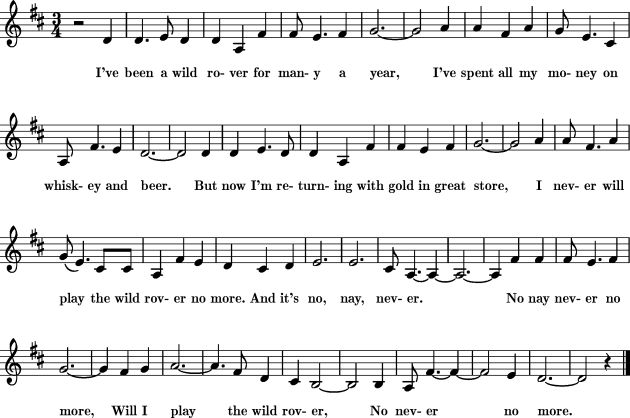Subject: RE: Origins: Wild Rover
From:
Peace
Date: 28 Dec 06 - 03:43 PM
"Wild Rover No More" from
www.csufresno.edu/folklore/BalladIndex.html
Wild Rover No More DESCRIPTION: The singer "has been a wild rover for many a year; I've spent all my money on whisky and beer." After years of carousing, he has gone broke and/or struck it rich; he vows that "never no more, It's never, never, never I'll play The wild rover no more."
AUTHOR: unknown
EARLIEST DATE: before 1829 (broadside, Bodleian Harding B 25(2055))
KEYWORDS: rambling poverty money travel hardtimes drink landlord floatingverses
FOUND IN: Britain(England(Lond,South),Scotland) Australia Ireland Canada(Mar) US(Ro,So)
REFERENCES (15 citations):
Meredith/Anderson, pp. 69-70, "Wild Rover" (a fragment); pp. 87-88, 127-128, "Wild Rover No More"; pp. 176-177, "I've Been a Wild Boy" (4 texts, 4 tunes)
Paterson/Fahey/Seal, pp. 296-297, "Wild Rover No More" (1 text)
Randolph 166, "The Horse-Thief" (1 text, 1 tune, which appears to be associated with this song although the text is so short that it might be part of a different piece)
High, pp. 35-36, "Ile B A Good Boy & Do So Nomore" (1 text)
Hubbard, #147, "The Wild Rover" (1 text, 1 tune)
Fahey-Eureka, pp. 196-197, "The Wild Boy" (1 text, 1 tune)
Spaeth-WeepMore, pp. 190-191, "Wild Rover" (1 text)
MacSeegTrav 113, "The Wild Rover" (1 text, 1 tune)
Kennedy 288, "Wild Rover" (1 text, 1 tune)
Wiltshire-WSRO Wt 476, "Wild Rover" (1 text)
GreigDuncan7 1480, GreigDuncan8 Addenda, "The Wild Rover" (7 texts, 5 tunes)
Manifold-PASB, pp. 146-147, "Wild Rover No More" (1 text, 1 tune)
Creighton-NovaScotia 65, "Wild Rover" (1 text, 1 tune)
Silber-FSWB, p. 57, "Wild Rover" (1 text)
DT, WLDROVER*
Roud #1173
RECORDINGS:
John Greenway, "Wild Rover No More" (on JGreenway01)
Sam Larner, "The Wild Rover" (on SLarner02)
BROADSIDES:
Bodleian, Harding B 25(2055), "Wild Rover" ("I have been a wild rover these dozen years"), T. Batchelar (London), 1817-1828; Harding B 16(307d), Johnson Ballads 613, Firth c.18(239), Firth c.18(244), Harding B 25(2055), "[The] Wild Rover"; Harding B 11(4217), "Wild Rover!"
CROSS-REFERENCES:
cf. "Johnny the Sailor (Green Beds)" [Laws K36] (plot)
cf. "Tambaroora Gold" (theme)
cf. "Moonshiner" (floating lyrics)
cf. "All My Trials" (lyrics)
cf. "Take Me Back to Tulsa" (lyrics)
cf. "The Strawberry Roan" [Laws B18] (tune)
cf. "Limbo" (theme)
cf. "I'll Be a Good Boy" (lyrics, theme)
ALTERNATE TITLES:
No, No, Never
NOTES: Meredith and Anderson claim that their fourth version, "I've Been a Wild Boy," has "no connection with the well-known 'Wild Rover No More.'" The same could be argued for Fahey's "The Wild Boy," since it lacks the "Wild Rover No More" chorus. Both songs also share an initial verse not found in the standard version:
My father died and left me his estate,
I married a lady whose fortune was great
And through keeping bad company I've spent all my store;
I've been a wild boy, but I'll be so no more.
There is something similar in High
When I was a young boy my fortune was not great,
I married me a rich widow with a very large estate,
With drinking and gambling I soon spent all her store,
But now I'll be a good bo and so no no more.
It will, however, be observed that the basic plot of all these songs is that of the "Wild Rover." The also share extensive floating lyrics. It may well be that this mixed "Wild Rover" is a fusion of earlier pieces. At this time, however, I am unable to distinguish the two.
Interestingly, although the song predates "The Strawberry Roan" by a century or so, Greenway's version is sung to a variant of that tune. - RBW
Kennedy and MacColl/Seeger both lump this song with "Moonshiner." I don't think so -- although they share a few lines -- but they do deserve a cross-reference.
No, I'm not making up the "All My Trials" and "Take Me Back to Tulsa" cross-references; Sam Larner included the "If living was a thing was money could buy/The rich would live and the poor would die" and "Little bee sucks the blossom, big bee gets the honey" floaters in his version. - PJS
John Greenway's "Wild Rover," which seems to be pretty well mixed, refers to the prisoner being sent to "Nugget." This is surely an error for "Newgate," the famous English prison. - RBW
Last updated in version 3.8�
File: MA069
Go to the Ballad Search form
Go to the Ballad Index Song List Go to the Ballad Index Instructions
Go to the Ballad Index Bibliography or Discography The Ballad Index Copyright 2016 by Robert B. Waltz and David G. Engle.
Digital Tradition Lyrics:
WILD ROVER (NO NAY NEVER)
I've been a wild rover for many a year
And I spent all my money on whiskey and beer,
And now I'm returning with gold in great store
And I never will play the wild rover no more.
cho: And it's no, nay, never,
No nay never no more,
Will I play the wild rover
No never no more.
I went to an ale-house I used to frequent
And I told the landlady my money was spent.
I asked her for credit, she answered me "nay
Such a custom as yours I could have any day."
cho:
I took from my pocket ten sovereigns bright
And the landlady's eyes opened wide with delight.
She said "I have whiskey and wines of the best
And the words that I spoke sure were only in jest."
cho:
I'll go home to my parents, confess what I've done
And I'll ask them to pardon their prodigal son.
And if they caress (forgive) me as ofttimes before
Sure I never will play the wild rover no more.
cho:
@drink
filename[ WLDROVER
TUNE FILE: WLDROVER
CLICK TO PLAY
sung by Clancy Brothers
RG

|
